Next week, I will have lived in Columbus for 21 years. There’s a large Victorian cemetery on the west side of town called Greenlawn Cemetery, which describes itself as “a very special park.” Until today, I had never been to Greenlawn. Since it was Memorial Day today, Susan and I decided to pay it a visit in an effort to pay tribute to some of the many military veterans who rest there. It will remind visitors of Hollywood Cemetery in Richmond, Laurel Hill Cemetery in Philadelphia, or Spring Grove Cemetery in Cincinnati–as much Victorian destination as cemetery.
We didn’t get a formal tour, although there were formal tours being offered. That means we missed a lot. Among the interesting graves we missed were Capt. Eddie Rickenbacker’s, a Buffalo Soldier who was awarded the Medal of Honor during the Indian wars, and a soldier who was awarded the Medal of Honor for carrying water to the Reno/Benteen battalion at the Battle of the Little Big Horn. Samuel P. Bush, the grandfather of Pres. George H. W. Bush and the great-grandfather of Pres. George W. Bush, is buried there, as are the grandparents of Pres. Woodrow Wilson. I’m going to have to go back, probably sooner than later, to see the rest of these interesting grave sites.
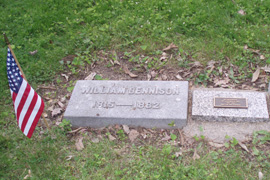
This is the grave of Gov. William N. Dennison, Ohio’s first Civil War-era governor. His son, Lt. William N. Dennison, a talented horse artillerist who served with the Army of the Potomac’s Cavalry Corps, is buried a few feet away.
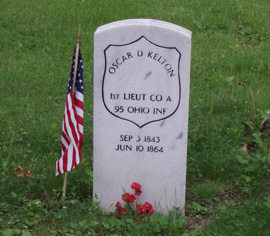
This is the grave of Lt. Oscar Kelton of the 95th Ohio Volunteer Infantry. The Kelton family was prominent in Nineteenth Century Columbus; the family home, which was a stop on the Underground Railroad, is a museum today. Lt. Kelton was KIA during Sherman’s Meridian Campaign in 1864. He was only 21 years old.

This is the grave of Maj. Gen. Irvin McDowell’s father, who was a War of 1812 veteran.
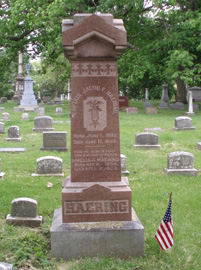
This is the grave of Jacob Haering, a Civil War veteran. I thought it was an extremely interesting monument, which is why I shot it. Note the GAR medal portrayed on the monument.

There are two sections of Civil War veterans. One of them includes a number of unknowns, as well as a number of United States Colored Troops, whose graves are interspersed among the the graves of the white soldiers who served alongside them. This is the grave of Pvt. Andy Grey, who served in the 15th U. S. Colored Infantry.

One of a number of unknown Union soldiers buried in the larger section.
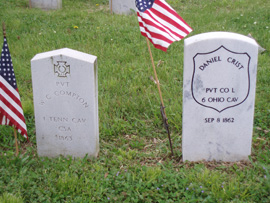
Brothers in arms, if not in service. Private Compton probably died at the Confederate prisoner of war prison site at Camp Chase.
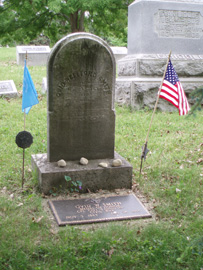
This is the grave of Ovid Wellford Smith, one of the Andrews Raiders, of Great Locomotive Chase fame. Like most of the raiders, Smith was awarded the Medal of Honor for his valor. His grave is the only one in the entire cemetery to have its own state historical marker.
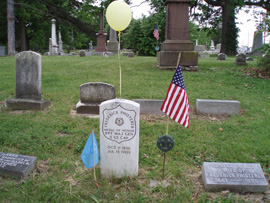
This is the grave of another Medal of Honor winner, Bvt. Maj. Gen. Frederick Phisterer. He was awarded the MOH as a First Lieutenant in the 18th U.S. Infantry for action on December 31, 1862 at Stone River, Tennessee. His citation reads “Voluntarily conveyed, under a heavy fire, information to the comander of a battalion of regular troops by which the battalion was saved from capture or annihilation.”
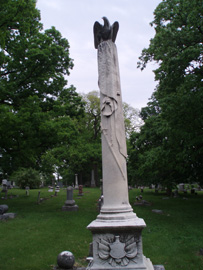
This is the grave marker of a young Union soldier who died of disease at Fortress Monroe in early 1864. The marker depicts a saber, the U.S. flag, an eagle on top, and a detail at the bottom showing a cannon tube, several rifles with bayonets, and several cavalry sabers. It’s without doubt one of the most interesting Civil War grave markers I’ve ever seen. And it belongs to a common soldier, which makes it even more interesting.
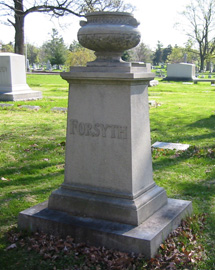
Thanks to Susan Forsyth for passing this one along. This is the grave of Brig. Gen. James William “Tony” Forsyth, Philip H. Sheridan’s chief of staff, who commanded the U. S. troops at the Wounded Knee episode in 1890. Forsyth was married to one of Governor Dennison’s daughters.
To all of our veterans, past, present, and future, thank you for your sacrifices in giving us the country that we enjoy today, and a special thank you to SSgt. Morton L. Wittenberg, 14th Air Force, who served in North Africa and Italy during World War II, and who shuffled off this mortal coil much too soon in December 1980.
Scridb filterComments
Comments are closed.
Notice: Undefined index: id in /home/netscrib/public_html/civilwarcavalry/wp-content/themes/wittenberg/footer.php on line 8
Notice: Undefined index: id in /home/netscrib/public_html/civilwarcavalry/wp-content/themes/wittenberg/footer.php on line 8
Notice: Undefined index: std in /home/netscrib/public_html/civilwarcavalry/wp-content/themes/wittenberg/footer.php on line 8
Notice: Undefined index: id in /home/netscrib/public_html/civilwarcavalry/wp-content/themes/wittenberg/footer.php on line 8
Notice: Undefined index: id in /home/netscrib/public_html/civilwarcavalry/wp-content/themes/wittenberg/footer.php on line 8
Notice: Undefined index: std in /home/netscrib/public_html/civilwarcavalry/wp-content/themes/wittenberg/footer.php on line 8
Notice: Undefined index: id in /home/netscrib/public_html/civilwarcavalry/wp-content/themes/wittenberg/footer.php on line 8
Notice: Undefined index: id in /home/netscrib/public_html/civilwarcavalry/wp-content/themes/wittenberg/footer.php on line 8
Notice: Undefined index: std in /home/netscrib/public_html/civilwarcavalry/wp-content/themes/wittenberg/footer.php on line 8
Notice: Undefined index: id in /home/netscrib/public_html/civilwarcavalry/wp-content/themes/wittenberg/footer.php on line 8
Notice: Undefined index: id in /home/netscrib/public_html/civilwarcavalry/wp-content/themes/wittenberg/footer.php on line 8
Notice: Undefined index: std in /home/netscrib/public_html/civilwarcavalry/wp-content/themes/wittenberg/footer.php on line 8
Notice: Undefined index: id in /home/netscrib/public_html/civilwarcavalry/wp-content/themes/wittenberg/footer.php on line 8
Notice: Undefined index: id in /home/netscrib/public_html/civilwarcavalry/wp-content/themes/wittenberg/footer.php on line 8
Notice: Undefined index: std in /home/netscrib/public_html/civilwarcavalry/wp-content/themes/wittenberg/footer.php on line 8
Notice: Undefined index: id in /home/netscrib/public_html/civilwarcavalry/wp-content/themes/wittenberg/footer.php on line 8
Notice: Undefined index: id in /home/netscrib/public_html/civilwarcavalry/wp-content/themes/wittenberg/footer.php on line 8
Notice: Undefined index: std in /home/netscrib/public_html/civilwarcavalry/wp-content/themes/wittenberg/footer.php on line 8
Notice: Undefined index: id in /home/netscrib/public_html/civilwarcavalry/wp-content/themes/wittenberg/footer.php on line 8
Notice: Undefined index: id in /home/netscrib/public_html/civilwarcavalry/wp-content/themes/wittenberg/footer.php on line 8
Notice: Undefined index: std in /home/netscrib/public_html/civilwarcavalry/wp-content/themes/wittenberg/footer.php on line 8
Notice: Undefined index: id in /home/netscrib/public_html/civilwarcavalry/wp-content/themes/wittenberg/footer.php on line 8
Notice: Undefined index: id in /home/netscrib/public_html/civilwarcavalry/wp-content/themes/wittenberg/footer.php on line 8
Notice: Undefined index: std in /home/netscrib/public_html/civilwarcavalry/wp-content/themes/wittenberg/footer.php on line 8
Notice: Undefined index: id in /home/netscrib/public_html/civilwarcavalry/wp-content/themes/wittenberg/footer.php on line 8
Notice: Undefined index: id in /home/netscrib/public_html/civilwarcavalry/wp-content/themes/wittenberg/footer.php on line 8
Notice: Undefined index: std in /home/netscrib/public_html/civilwarcavalry/wp-content/themes/wittenberg/footer.php on line 8
Notice: Undefined index: id in /home/netscrib/public_html/civilwarcavalry/wp-content/themes/wittenberg/footer.php on line 8
Notice: Undefined index: id in /home/netscrib/public_html/civilwarcavalry/wp-content/themes/wittenberg/footer.php on line 8
Notice: Undefined index: std in /home/netscrib/public_html/civilwarcavalry/wp-content/themes/wittenberg/footer.php on line 8
Notice: Undefined index: id in /home/netscrib/public_html/civilwarcavalry/wp-content/themes/wittenberg/footer.php on line 8
Notice: Undefined index: id in /home/netscrib/public_html/civilwarcavalry/wp-content/themes/wittenberg/footer.php on line 8
Notice: Undefined index: std in /home/netscrib/public_html/civilwarcavalry/wp-content/themes/wittenberg/footer.php on line 8
Notice: Undefined index: id in /home/netscrib/public_html/civilwarcavalry/wp-content/themes/wittenberg/footer.php on line 8
Notice: Undefined index: id in /home/netscrib/public_html/civilwarcavalry/wp-content/themes/wittenberg/footer.php on line 8
Notice: Undefined index: std in /home/netscrib/public_html/civilwarcavalry/wp-content/themes/wittenberg/footer.php on line 8
Notice: Undefined index: id in /home/netscrib/public_html/civilwarcavalry/wp-content/themes/wittenberg/footer.php on line 8
Notice: Undefined index: id in /home/netscrib/public_html/civilwarcavalry/wp-content/themes/wittenberg/footer.php on line 8
Notice: Undefined index: std in /home/netscrib/public_html/civilwarcavalry/wp-content/themes/wittenberg/footer.php on line 8
Notice: Undefined index: id in /home/netscrib/public_html/civilwarcavalry/wp-content/themes/wittenberg/footer.php on line 8
Notice: Undefined index: id in /home/netscrib/public_html/civilwarcavalry/wp-content/themes/wittenberg/footer.php on line 8
Notice: Undefined index: std in /home/netscrib/public_html/civilwarcavalry/wp-content/themes/wittenberg/footer.php on line 8
Notice: Undefined index: id in /home/netscrib/public_html/civilwarcavalry/wp-content/themes/wittenberg/footer.php on line 8
Notice: Undefined index: id in /home/netscrib/public_html/civilwarcavalry/wp-content/themes/wittenberg/footer.php on line 8
Notice: Undefined index: std in /home/netscrib/public_html/civilwarcavalry/wp-content/themes/wittenberg/footer.php on line 8
Notice: Undefined index: id in /home/netscrib/public_html/civilwarcavalry/wp-content/themes/wittenberg/footer.php on line 8
Notice: Undefined index: id in /home/netscrib/public_html/civilwarcavalry/wp-content/themes/wittenberg/footer.php on line 8
Notice: Undefined index: std in /home/netscrib/public_html/civilwarcavalry/wp-content/themes/wittenberg/footer.php on line 8
Notice: Undefined index: id in /home/netscrib/public_html/civilwarcavalry/wp-content/themes/wittenberg/footer.php on line 8
Notice: Undefined index: id in /home/netscrib/public_html/civilwarcavalry/wp-content/themes/wittenberg/footer.php on line 8
Notice: Undefined index: std in /home/netscrib/public_html/civilwarcavalry/wp-content/themes/wittenberg/footer.php on line 8
Notice: Undefined index: id in /home/netscrib/public_html/civilwarcavalry/wp-content/themes/wittenberg/footer.php on line 8
Notice: Undefined index: id in /home/netscrib/public_html/civilwarcavalry/wp-content/themes/wittenberg/footer.php on line 8
Notice: Undefined index: std in /home/netscrib/public_html/civilwarcavalry/wp-content/themes/wittenberg/footer.php on line 8
Notice: Undefined index: id in /home/netscrib/public_html/civilwarcavalry/wp-content/themes/wittenberg/footer.php on line 8
Notice: Undefined index: id in /home/netscrib/public_html/civilwarcavalry/wp-content/themes/wittenberg/footer.php on line 8
Notice: Undefined index: std in /home/netscrib/public_html/civilwarcavalry/wp-content/themes/wittenberg/footer.php on line 8
Notice: Undefined index: id in /home/netscrib/public_html/civilwarcavalry/wp-content/themes/wittenberg/footer.php on line 8
Notice: Undefined index: id in /home/netscrib/public_html/civilwarcavalry/wp-content/themes/wittenberg/footer.php on line 8
Notice: Undefined index: std in /home/netscrib/public_html/civilwarcavalry/wp-content/themes/wittenberg/footer.php on line 8
Notice: Undefined index: id in /home/netscrib/public_html/civilwarcavalry/wp-content/themes/wittenberg/footer.php on line 8
Notice: Undefined index: id in /home/netscrib/public_html/civilwarcavalry/wp-content/themes/wittenberg/footer.php on line 8
Notice: Undefined index: std in /home/netscrib/public_html/civilwarcavalry/wp-content/themes/wittenberg/footer.php on line 8







 Back to top
Back to top Blogs I like
Blogs I like 
Is that Irvin’s brother John McDowell, discussed here: http://bullrunnings.wordpress.com/2007/08/01/the-mcdowell-monument/ ?
Harry,
No. This grave belonged to a War of 1812 vet. I believe it to have been the grave of Irvin’s father.
Eric
OK – I wrote my comment before you had completed your text. Irvin’s (and John’s) old man served a year as mayor of Columbus, by the way.
Eicher & Eicher list these Civil War notables for Green Lawn Cemetery in “Civil War High Commands”:
Comly, James Monroe Stuart, 26 July 1887
Dennison, William, 15 June 1882
Forsyth, James William, 24 Oct. 1906
Hamilton, William Douglas, 22 Jan. 1916
Jones, Theodore, 13 Mar. 1916
McMillen, William Linn, 8 Feb. 1902
• Medary, Samuel, 7 Nov. 1864
Mitchell, John Grant, 7 Nov. 1894
Pease, Phineas, 8 Oct. 1893
Potter, Joseph Hayden, 1 Dec. 1892
Powell, Eugene, 17 Mar. 1907
Smith, Orland, 4 Oct. 1903
Walcutt, Charles Carroll, 2 May 1898
Wilcox, James Andrews, 26 Sept. 1891
Wilson, William Tecumseh, 5 June 1905
Zeigler, George Milton, 7 June 1912
Eric,
I’ve lived in the Columbus area for almost 7 yrs and i’ve never been to Greenlawn either. I want to check it out now, thanks! Speaking of the Kelton House did you know that it is the sister house of the Mercer House in Savannah, GA? (of Midnight in the Garden of Good and Evil fame) They are both neat homes.
Tom
Eric,
Many thanks for the pix and this post. Definitely have to put it on the to do list next time I’m in the Columbus area.
Regards,
Keith
David,
Good stuff, thanks for sharing that. Next time, I will have to track down Orland Smith’s grave. He was a brigade commander in the 11th Corps at Gettysburg.
Eric
Tom,
No, I didn’t–thanks for telling me that.
Eric
Keith,
C’mon up. I will be happy to give you a tour.
Eric
James William Forsyth (not William, unless I missed an inside joke) was on Sheridan’s staff during the CW and later commanded the 7th US Cavalry during the Battle of Wounded Knee in 1890.
Orland Smith (1825-1903) was colonel of the 73rd Ohio Infantry at McDowell, Cross Keys, and Second Bull Run. Smith commanded a brigade in the 11th Corps at Gettysburg and later in Tennessee. He managed railroads from Baltimore after the war.
Todd Berkoff
Also, William Dennison (1815-1882) was the governor of Ohio from 1860-1862 and US Postmaster General. Dennison’s son William Neil Dennison (1841-1904) was a much-photographed horse artillery officer in the Army of the Potomac. Dennison served in Battery A, 2nd US Artillery under John Tidball and is in the famous photograph of Tidball and another officer leaning on the 3-inch Ordinance rifle during the Peninsula Campaign — both father and son are buried in Greenlawn. http://www.blongerbros.com/graftersClub/bios/Dennison.asp
Todd Berkoff
Can you put me in touch with Susan Forsyth by e-mail address. I havce been doing research on General Forsyth and if she is related she may have interest. Also Tonys wife Elizabeth was the daughter of the governor of Ohio. Her maiden name was Dennison. A great post. Thanks Eric
I would like to be in touch with James McCorry; Forsyth was my Great-great-grandfather and I am in touch with several historians interested in his life. Susan Forsyth is a distant relative, an historian in the UK interested in Forsyth. She toured the Cemetery last year while doihg research in the U.S.. I can help you reach other historians in U.S. with interest, and I would like to learn from you, as well.
Melissa
i’ve been collecting 95th o.v.i. info for years and have been to a majority of their battle sites etc. if anyone wants to share info i will be delighted to share mine.
my ancestor is pvt. dan’l timmons of co. b. greenlawn
has one of the greatest monuments on site, worthy of any battlefield, bvt maj gen mcmillen and several graves of men from the 95th ohio.and of course eddie
richenbacher,ww1 flying ace. more history in that cemetery than on some historic sites and battlefields